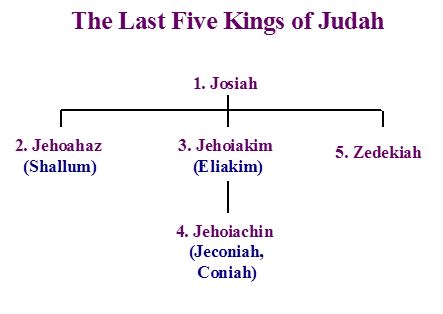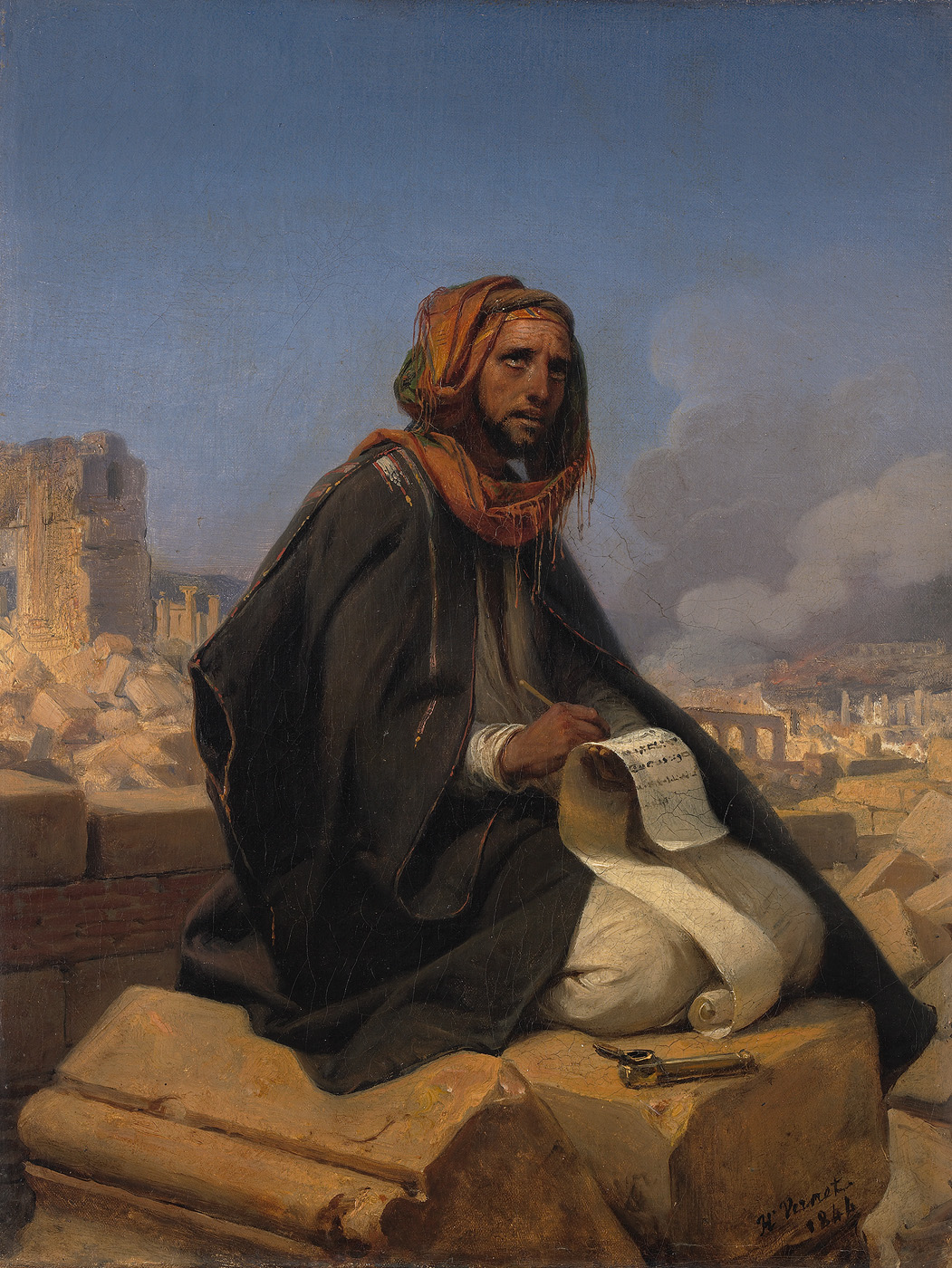
'JEREMIAH was contempory with Lehi though almost a generation older. He was Lehi's
prophet in the time of King Josiah through King Zedekiah. Jeremiah was of the tribe of Benjamin and
Lehi was of Manasseh. Jeremiah was placed in prison about the time Nephi and his
brothers returned to bring the family of Ishmael down into the wilderness.
~ Jeremiah 37:15-21, 1 Nephi 7:14
“Jeremiah lived in a difficult time and place, but the Lord allowed him to foresee ‘a time of hope
during the latter-day gathering of Israel.”1 — Linda K. Burton,
Relief Society general president
|
The book of Jeremiah has been confounded. A number of critical time related
'chapters/scrolls' have been placed out of order and many time gaps suggest sections of
Jeremiah are missing, as it is not chronologicly coherent. For example the chapter
chronology order of the last years of Zedekiah's reign is: 34, 37, 32, 33, 38,
39, with portions of others possibly fitted in. And the rest of Zedekiah's reign
from its beginning is mostly missing from today's book of Jeremiah. It's as though it's not
wanting to reveal what was happening in Zedekiah's reign.
ZEDEKIAH (597-586 OT | 601-591 BM)
Year 601BM/597OT: 23-24, 29-31, 49:34-39
~ missing years ~
Year 597BM/593OT: 27-28, 51:59-64
~ missing years ~
Year 592BM/588OT: 34:1-10, 21, 34:11-22, 37
Year 591BM/587OT: 32-33
Year 590BM/586OT: 38:15-18, 39
|
[This Section Is Given As if Isaiah Is Narrating His Story]
I am the son of Hilkiah, a priest in Anathoth, near Jerusalem. During my youth, “the word of the
Lord came unto me, saying,
“Before I formed thee in the belly I knew thee; and before thou camest forth out of the womb I
sanctified thee, and I ordained thee a prophet unto the nations.”
I felt unprepared for this calling, and I replied, “Behold, I cannot speak: for I am a child.”
The Lord replied, “Say not, I am a child: for thou shalt go to all that I shall send thee, and
whatsoever I command thee thou shalt speak.
“Be not afraid of their faces: for I am with thee to deliver thee.” The Lord then “touched my mouth”
and put words into it.2
I prophesied in Jerusalem for 40 years, from 626 to 586 b.c., during the reigns of Josiah,
Jehoahaz, Jehoiakim, Jehoiachin and Zedekiah.3 I was a contemporary of the Book
of Mormon prophet Lehi. We both condemned the wickedness of the people in Jerusalem and
foretold the destruction of that great city.4
The Lord commanded me to record my prophecies in “a roll of a book.”5 When King Jehoiakim
heard the prophecies, he burned the roll. The Lord commanded me to write the prophecies again and
add many more to them.6
I faced continuous opposition as I preached the Lord’s word. Pashur, the son of the chief governor,
smote me and put me in the stocks. The mobs wanted to put me to death for my preaching. I was an
unpopular prophet, and was cast into dungeons and prison. I lived in a time of truly great
wickedness.7
But despite living in the midst of tribulation, the Lord allowed me to foresee that the Israelites
would be gathered in the last day, that the Lord would write His law “in their hearts,” and that He
would bring “one of a city, and two of a family” to Zion.8
As I continued to preach the Lord’s word—even when it was difficult—I learned that an inward
commitment to the gospel leads to peace. As we develop individual fellowship with the Lord, we can
all experience hope amid trials and tribulation.
|
Jeremiah & Zedekiah:
Jeremiah was first prophet with Judah's 'most righteous king' Josiah, who gathered the Jews
together and placed them under temple covenant to live the Law of Moses. Jeremiah
saw four kings of Judah come and go. The last was Zedekiah who was positioned by King
Nebucadnezar to be king in the stead of Jehoiachin who only reigned a few months.
Like unto the gathering of the Jews in the days of his father Josiah, under the cause of the
King of Babylon, Zedekiah did proceed to place the Jews under temple covenant to live the Law
of Moses, which included the releasing of their 'Hebrew' slave-servants as recorded in a 'flash
back' to the beginning of Zedekiah's rule in Jeremiah 34:8-22. [most scholars mistake this as
a period event] King Nebuchadnezar had Zedekiah place himself and his people under covenant
in the name of the Lord to live the Lord's law and through their king Zedekiah to pledge their
subservance to Babylon. This they did and they even released their Hebrew servants for a time
until the Babylonian officals had removed themselves.
At that time the 'prince rulers of the covenant' interpreted that the Law of
Moses they had entered really meant in seven years time they were to release the Hebrew
servants and it WAS NOT intended that they were to immediately be release. Thus all of the Jews
reclaimed their servants who returned to servitude. This was when Lehi became
concerned and went out and prayed unto the Lord as recored in 1 Nephi 1:5>.
By the middle of Zedekiah's first year, Lehi had prophesied against the Jews that Jerusalem
would be destroyed and the Jewish Rulers were intent on killing Lehi whose social position was
'one of them.' The Lord warned Lehi and he removed his family in the wilderness east along the
Red Sea.
|
|
[Fact/Information Box: Jeremiah]
- Name: Jeremiah meaning Jehovah exalts
- Birth: town of Anatoth in Benjamin, a Levite of Benjamin
- Age: Lived during times of 5 Jewish kings, Josiah-Zedekiah and beyond
- Genealogy: son of Hilkiah prophet and high priest
- Mortal roles: Prophet to Judah after time of scattering of Israel from 13th year
of Josiah (626 OT) to after the destruction of Jerusalem (587 OT).
- Famed role: A prophet like Moses. Prophet to the Last Five Kings of Judah

¶ "Thus saith the LORD; A voice was heard in Ramah, lamentation, and bitter weeping; Rahel
weeping for her children refused to be comforted for her children, because they were not.
"Thus saith the LORD; Refrain thy voice from weeping,
and thine eyes from tears: for thy work shall be rewarded, saith the LORD; and they shall come
again from the land of the enemy*."
~ Old Testament | Jeremiah 31:15-16
|
Jeremiah - Zedekiah Continued
What had occured by Jeremiah 34 is that even after seven years had lapsed the Jews still would
not release their Hebrew servants. Thus they had openly made a mockery of the Law of God and
the Lord had Jeremiah condemned them to destruction.
Now the Jews were guilty of grosser sins but their skewed 'Sarim Rulers' of the covenant would not
find them guilty of what was 'privately done' and known but not disclosed in public officially.
But they could not deny their behavior concerning the Hebrew servants release, thus what was
completely a matter of public record could no longer be denied. And Zedekiah prophecied that the
'Chaldeans' [Babylonians] who had retreated to fight the coming Egyptians would by the LORD be
caused to return to the city to destory it.
After this Jeremiah's mission was completed and he later sought to withdraw himself to his home
land, being of the tribe of Benjamin. But he was stopped at the gate and taken and placed into
prison (Jeremiah 37:15-21) by the Sarim Rulers of the city. That is when Nephi and his brothers
also left to return with the family of Ishmael into the wilderness (1 Nephi 14:7).
|
 Reference Notes:
Reference Notes:
_______________
1.
Linda K. Burton, “Is Faith in the Atonement of Jesus Christ Written in Our Hearts?” Ensign, Nov.
2012, 111.
2.
See Jeremiah 1:1–9.
3.
See Guide to the Scriptures, “Jeremiah,” & Bible Dictonary, Chronology Tables,
scriptures.lds.org.
4.
See Jeremiah 6; 1 Nephi 1:13, 18–20.
5.
Jeremiah 36:2.
6.
See Jeremiah 36:23–32.
7.
See Jeremiah 20:2; 26:8; 38:6.
8.
Jeremiah 31:33; 3:14.
"Then was fulfilled that which was spoken by Jeremy the prophet, saying,
"In Rama was there a voice heard, lamentation, and weeping, and great mourning, Rachel
weeping for her children, and would not be comforted, because they are not."
~ New Testament | Matthew 2:17-18
~ Weeping Prophet of Jerusalem ~
|